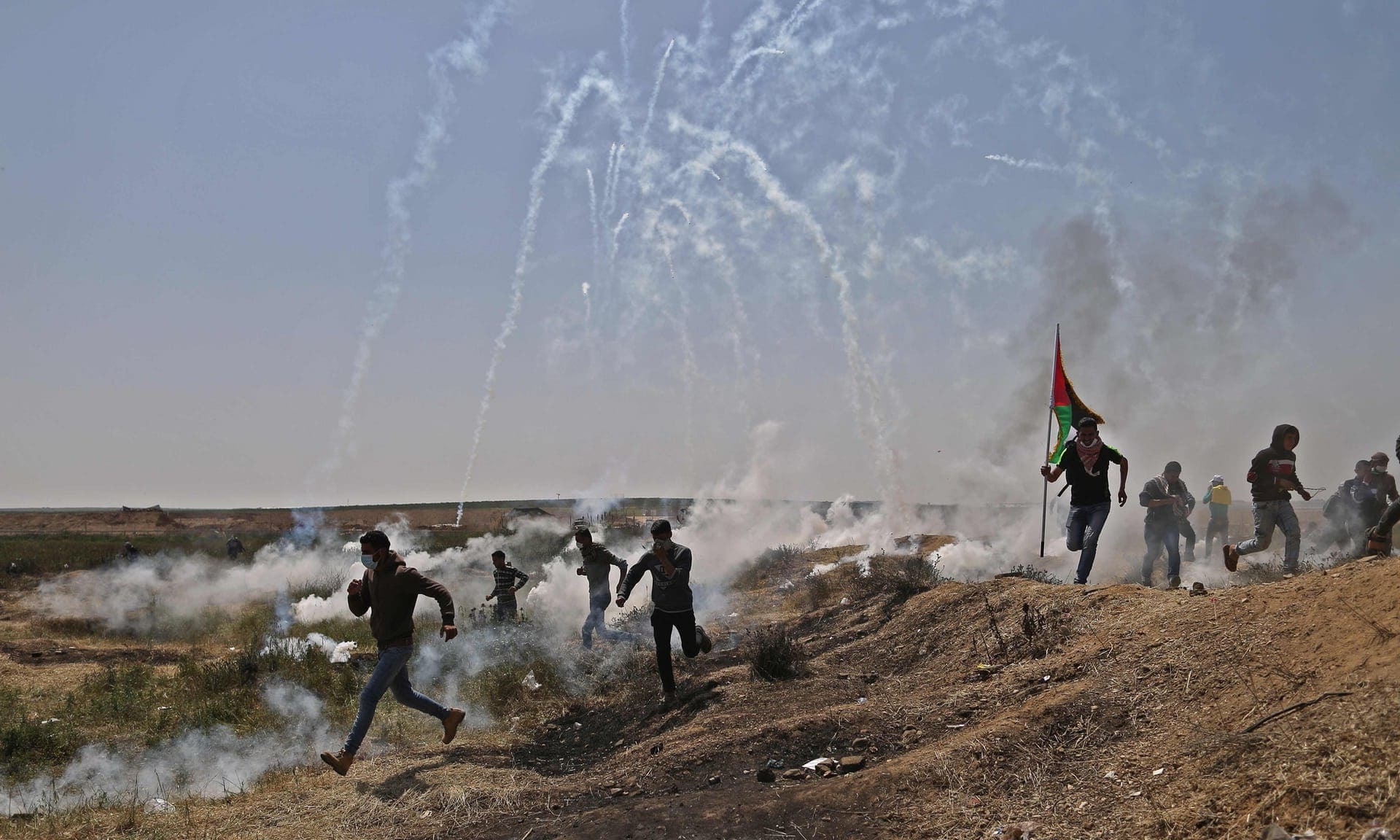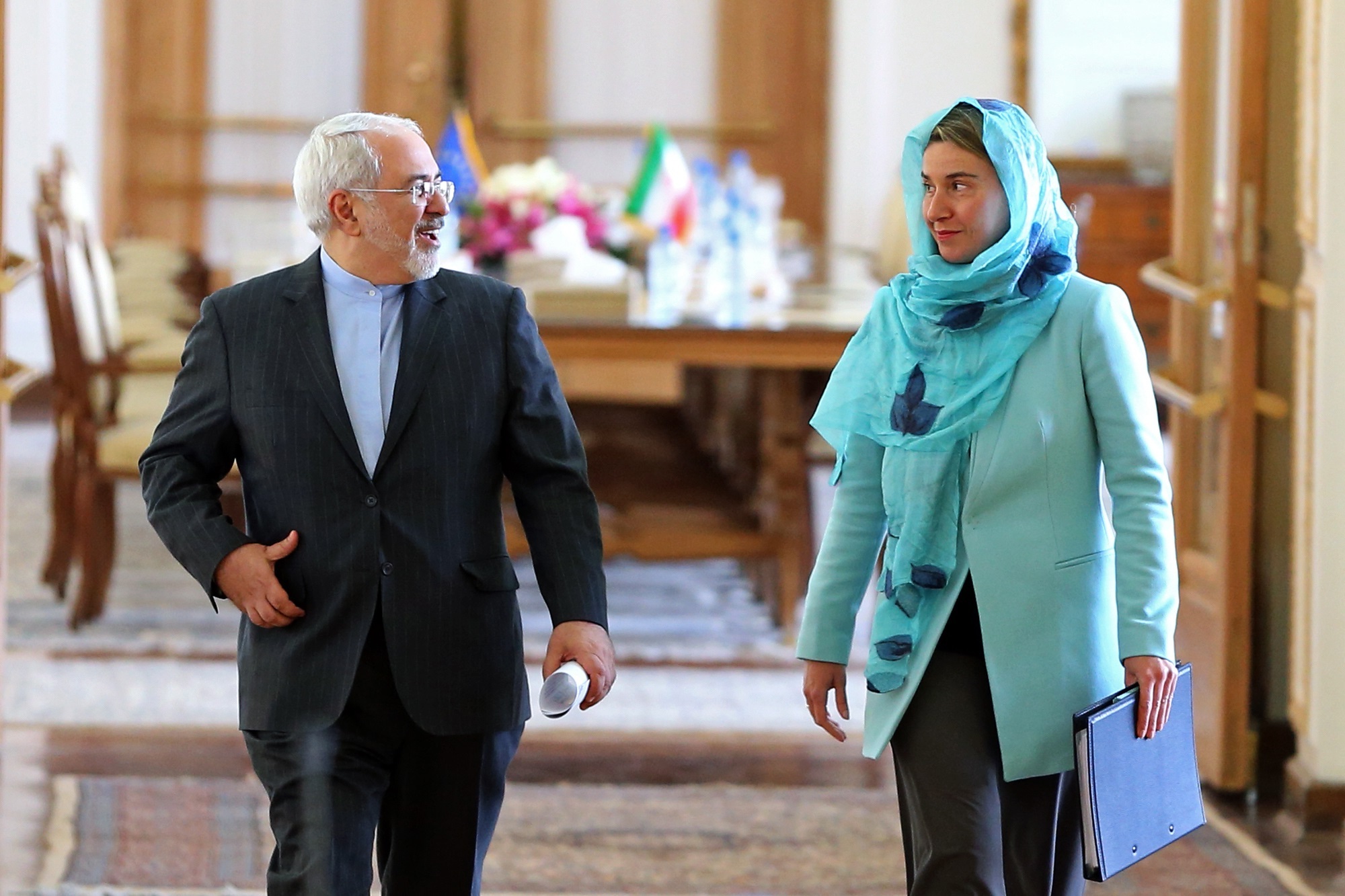
That the sequence of events that unfolded on the Gaza border last Friday was entirely predictable, and that the reaction to those events was even more so, does not make the aftermath any more palatable. The “March of Return” that began last week and is scheduled to resume each Friday for the next six weeks, ultimately culminating in a May 15 Nakba Day effort to storm the border fence, has been in the works for months.
Israel had plenty of time to prepare for it, as it watched tent encampments and paved pavilions get built on the Gaza side. The march’s organizers, which did not include Hamas at the start but certainly did by the end, also had time to prepare as they absorbed the warnings issued by Defense Minister Avigdor Lieberman and IDF officials and watched Israeli sharpshooters settle in on the Israeli side of the border.
What unfolded followed a familiar pattern; Hamas embedded amongst larger number of civilians, did its best to provoke an Israeli response to its own violent tactics, Israel was unable to restrain itself and ended up killing and injuring a larger number of Palestinians than is feasible to explain or justify, and the battle to spin the result is now hotter than the actual battle itself.
Clashes between Israel and Palestinians in Gaza are for me one of the most difficult aspects of the Israeli-Palestinian conflict. Positions that are already hardened become even more so in the red hot Gaza forge, as you have Israel facing off against an actual terrorist group while casualty numbers – including civilian ones – mount terrifyingly fast and in a one-sided fashion on the Palestinian side.
[alert type=white ]Author: Michael Koplow is policy director of Israel Policy Forum[/alert]
While black and white tend not to be useful colors when thinking about conflict in the Holy Land, they dominate nearly every corner of the Israel-Palestine space whenever fighting erupts in Gaza. Rather than try to repaint the overall picture with some gray, it may be useful for each side to get some of the other side’s black and white in the hopes of avoiding the same predictable fault lines this Friday and every Friday for a month and a half.
To my friends and colleagues on the left: What happened on Friday was not a peaceful protest. The August 1963 March on Washington did not have galabaya-clad men throwing Molotov cocktails. Gandhi’s salt march did not feature burning tires and bullets across a border fence. If the five percent of violent actors abuse the ninety five percent of peaceful ones to wreak havoc, you cannot just pretend that the five percent do not exist and repeatedly state that Friday’s protest was a non-violent one. T
here were many peaceful protesters, and then a non-trivial group of ones who were there for nefarious purposes and nothing more. If the ones who truly want to engage in a mass act of protest and send a message to Israel and the wider world are unwilling to rein in the troublemakers in their midst, then they lose the moral high ground that they want to occupy but are unwilling to insist upon.
There is a border fence between Israel and Gaza. Unlike the security barrier in the West Bank, the route of which does not stick to the 1949 Armistice Green Line, the Gaza barrier is built precisely upon the line agreed upon by both sides in the Oslo II agreement in 1995. Israel has withdrawn all of its soldiers and citizens from Gaza and does not claim the territory for itself.
Attempts to tear down the fence or cross it to get into Israel illegally are not legitimate forms of protest, but criminal acts. Every country in the world has the right to police its own borders, and the vast majority of them do just that. Israel’s rules of engagement dictated firing at anyone who tried to cross the barrier or damage it, and in the context of borders around the world, that is both understandable and legitimate.
The majority of those killed on Friday were not good guys, freedom fighters, or human rights activists. They were known terrorists, identified by Israel and proudly claimed by Hamas itself. No deaths should ever be celebrated and that includes these ones, but let’s be clear about who these people were and what their aim was. Young men carrying AK-47s and grenades, shooting as they rush the fence, are not sympathetic figures and they deserve nobody’s sympathy. Israel makes plenty of mistakes and does plenty of things wrong – and if you haven’t smashed your screen in anger yet, I’m about to detail that too – but killing terrorists in the midst of violent acts is not one of them.
To my friends and colleagues on the right: Israel is not an innocent blameless actor, thrust into the furor surrounding it through no fault of its own. Set aside the Hamas fighters killed on Friday; Israel still wounded hundreds more. Just consider the odds of every single one of those people being a terrorist or someone affiliated with a terrorist group in the context of a gathering of twenty to thirty thousand people, and you’ll realize immediately that there is zero chance that Israel did not shoot and harm completely unarmed and innocent people. The fact that this is a lark compared to what goes on, say, in Syria does not make it beyond reproach. It also doesn’t matter that Hamas put Israel in the untenable situation in which it found itself, since this does not absolve the IDF from acting with the utmost care not to kill or even harm civilians who are in the way.
Israel had a barrier and trenches between it and anyone trying to breach the fence, and an array of snipers waiting for anyone who managed the feat. News reports indicate that most of those injured were not at the fence or in the no-go zone leading up to the fence. Hundreds of injuries not only looks terrible, it is terrible.
The IDF is not the most moral army in the world, because there is no most moral army in the world. I know this because the words “moral” and “army” are generally at odds, and there is no reason to think that the IDF is an exception to this rule that has lasted through centuries of time and space. Soldiers’ jobs are to kill other people, and when you are shooting at someone who is trying to kill you, human nature dictates that morality and ethics are not going to be at the forefront of your mind.
Crimes happen in war, and that Israeli soldiers do things that they aren’t supposed to does not make them worse than anyone else. It makes them exactly like everyone else. Repeating a completely indefensible and evidence-free platitude like a broken record not only harms your general credibility, it makes Israel’s foes work extra hard to demonstrate that your position is nonsensical and rub it in your face. It also creates an impossibly high standard that can never actually be met, setting Israeli soldiers up for certain failure.
The “most moral army in the world” talking point is both substantively and tactically foolish, it convinces nobody, and every time it is repeated it does more than anything else to shift the conversation on to Israel’s sins rather than its opponents’ ones.
The fact that there are no Israelis in Gaza does not mean that Israel has no responsibility for what goes on there. Israel controls Gaza’s airspace, enforces a blockade of it from the sea, and controls the border on two of the three remaining sides. It controls what goes into Gaza and what comes out of Gaza, both people and goods. Only someone who is willfully blind or purposely obtuse would deign to argue that Gaza is an independent territory free of Israeli control.
Israel has contributed to a staggeringly awful humanitarian crisis in Gaza, and Israel’s political leadership has used Hamas’s presence there to punish nearly two million people while avoiding having to make any hard decisions. You can talk all you want about rockets, but Hamas has not fired a rocket in fourteen months, and yet Israel has conceded nothing while every day the chances of an explosion increase. There is a reason that a majority of the cabinet in the most right-wing government in Israel’s history, along with near unanimity among the IDF leadership, support building Gaza a seaport and airport and ending its isolation from the rest of the world, yet Prime Minister Netanyahu sits on his hands.
If you were a Palestinian stuck in Gaza, with barely any potable water, sewage in the streets, electricity for four hours a day at best, and literally nowhere to go because Israel – and yes, Egypt too – won’t let you out, you’d be pretty despondent too. You may even do anything you could to get out, including trying to get past the border fence.
If you think this Friday was bad, each subsequent one is going to be worse and worse, and if tens of thousands of Palestinians indeed rush the fence and try to obliterate it on May 15, it really will represent Israel’s biggest crisis since the Yom Kippur War. All of this could have been avoided with some policy changes toward Gaza that may now be too late, and it’s not like the Israeli government didn’t have plenty of voices in its ear warning about just this scenario for months, if not years.
I don’t expect anyone to read this and fundamentally change their minds about the balance of what happened on Friday. I don’t claim any superior wisdom or moral authority on any of this. The only thing I am begging to get across is that none of this is as straightforward as it appears to those who are passionate about these issues, and if we at least take a small step in acknowledging that, perhaps it can lead to solutions rather than loud and drawn out arguments.
If there is one thing that I know, it is that solutions to the Gaza problem are desperately needed, since neither Israel nor the Palestinians benefit in any way from iterated and increasingly ramped up versions of what took place last week.
[toggler title=”SOURCE” ]This piece was originally published by OTTOMANS AND ZIONISTS.[/toggler]




